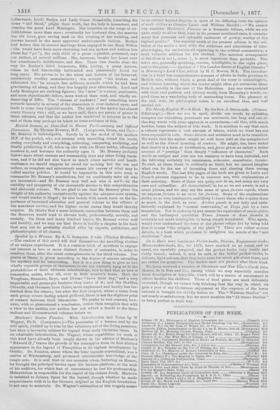The Handy English 4Vord - Book. By the Rev. J. Stormonth. (Nimmo
Edinburgh.)—How we are to spell, divide our words by syllables, compare our adjectives, punctuate our sentences, use long and out of- the-way words with some approach to correctness,—all this, with much besides, forms the subject of this work. It is needless to say that such a volume represents a vast amount of labour, which we trust has not been expended in vain. Some defects and mistakes need to be remedied. We think that the author might as well have told us the metaphorical as well as the literal meaning of caviare. He might, too, have stated that lunette is a term of fortification, andjiave given us rather a better account of "prestige" than simply "influence of character." Such words as antique and vase are too common to have been included, and the following certainly too uncommon, arborator, ausculiator, laxator. To such as these there is evidently no limit, but we cannot imagine what can be the use of inventing thorn and classing them among English words. The last fifty pages of the book are given to Latin and French phrases supposed to be in common use, with explanations of their meaning. Some of those are quito now to us, and many are very rare and unfamiliar. Alt inconvenienti, as far as we are aware, is not a usual phrase, and we may say the same of opum furiata cupid°, where we suppose/in-/eta is an error for furiosa. -Some of the explanations strike us as very inadequate, and likely tt leave those who require them as much in the dark as ever. Arriere pens& is not fully and satis- factorily explained by "mental reservation," or 7'roja felt by a bare translation. Nor is industry by,any means the equivalent of savoir-faire, and the hackneyed quotation Time° Danaos et &ma feretates is certainly not made intelligible by being simply translated. Who, again, would ever understand the force of the phrase religio loci by being told that it means "the religion of the place "? These are rather serious defects, in a book which professes to enlighten the minds of the "son studiorum " class.






































 Previous page
Previous page